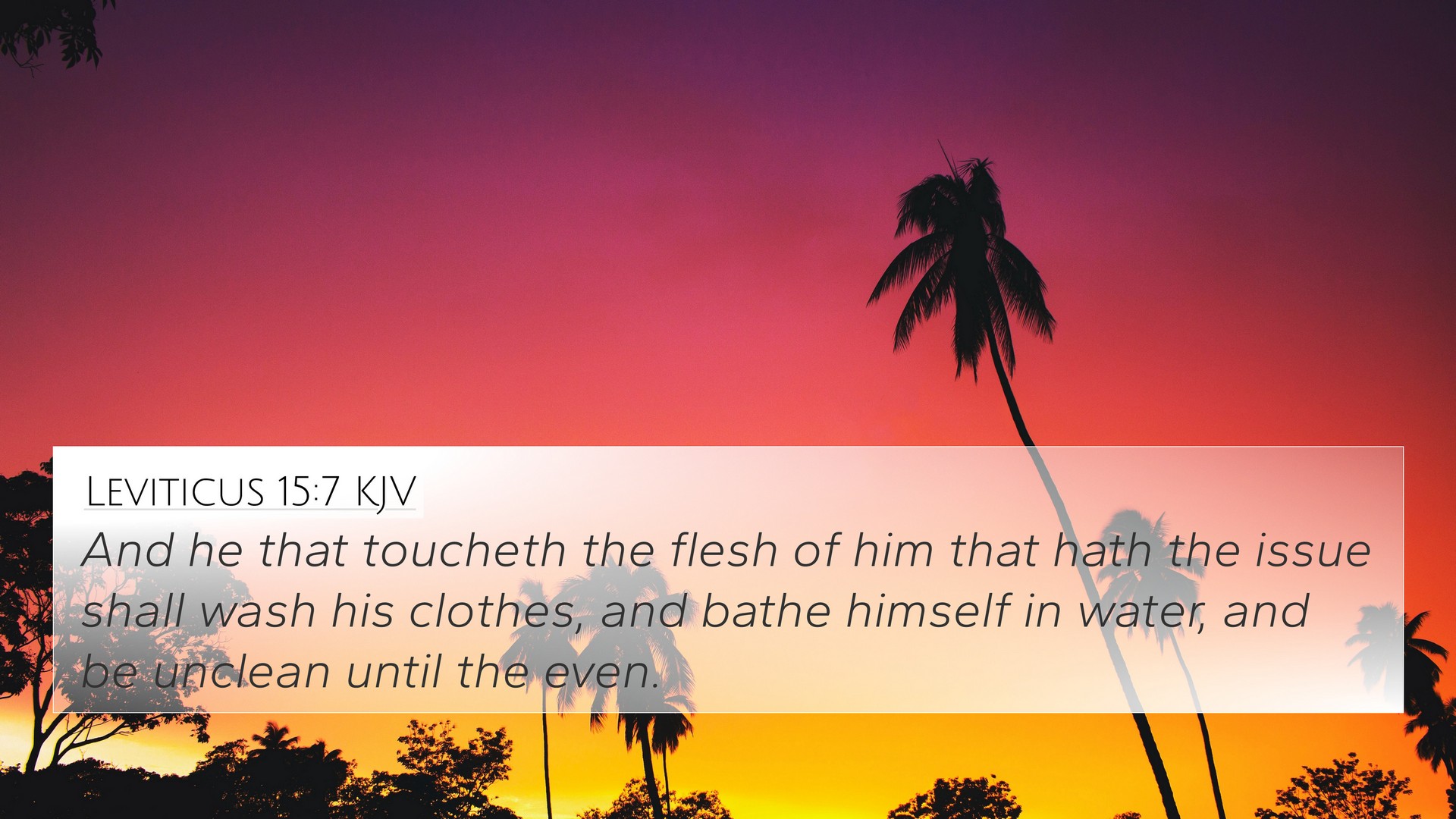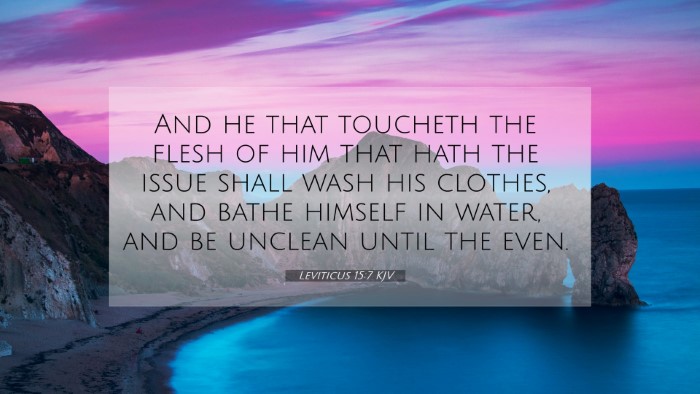Understanding Leviticus 15:7
Leviticus 15:7 states, "And he that touches the flesh of him that hath the issue shall wash his clothes, and bathe himself in water, and be unclean until the even." This verse is a part of the ceremonial laws outlined in the Mosaic Law concerning bodily discharges, particularly related to issues of cleanliness and holiness.
Overview of the Verse
This directive emphasizes the importance of avoiding ceremonial impurity that comes from contact with someone who has a bodily issue. It demonstrates God’s command for His people to practice hygiene and maintain holiness in their conduct. The unclean status from such contact necessitates washing and waiting until evening before being considered clean again.
Commentary Insights
- Matthew Henry: He discusses the broader principles of ceremonial purity, explaining that these rules represent a foreshadowing of Christ’s greater purification of believers. The act of washing signifies both physical cleansing and a spiritual readiness to stand before God.
- Albert Barnes: Barnes expounds on the health-related implications of these laws, noting that hygienic practices in the Old Testament served practical purposes, such as preventing the spread of disease. This highlights God's concern for both physical and spiritual well-being.
- Adam Clarke: Clarke emphasizes the spiritual lessons that can be drawn from these ordinances. He suggests that this law serves as a reminder of the need for spiritual vigilance and separation from sin, reflecting the importance of maintaining a pure heart before God.
Bible Cross-References
- Numbers 19:16 - Discusses the need to be cleansed after touching a dead body, paralleling the theme of ritual purity.
- Leviticus 11:24 - Talks about being made unclean by certain animals, highlighting the importance of dietary and physical cleanness.
- 1 Corinthians 6:19-20 - Paul reminds believers that their bodies are temples of the Holy Spirit, connecting the physical state of purity to spiritual implications.
- Hebrews 9:13-14 - Points out how the blood of Christ accomplishes a far greater cleansing than the rituals of the Old Testament.
- Matthew 23:25-26 - Jesus criticizes outward purity without inner cleansing, emphasizing the need for true holiness.
- James 4:8 - Encourages believers to "purify your hearts," showing the relationship between external actions and internal faith.
- Galatians 5:9 - A metaphor of leaven representing sin, teaching that a little impurity affects the whole body of believers.
Thematic Bible Verse Connections
The themes of purity, cleanliness, and the necessity of proper conduct permeate the scriptures:
- Purity of Heart: Psalm 24:4 - "He that hath clean hands, and a pure heart", teaches the value of integrity.
- Spiritual Cleansing: 1 John 1:9 - "If we confess our sins, He is faithful and just to forgive us our sins and to cleanse us from all unrighteousness".
- Holiness of God: Isaiah 6:3 - "Holy, holy, holy, is the Lord of hosts", signifies the importance of holiness in worship.
Conclusion
Leviticus 15:7 calls believers to a deeper understanding of purity that extends beyond mere physical cleanliness, urging readers to maintain spiritual integrity. This reflects an overarching biblical principle: God desires a clean and pure heart in His people. As we engage in cross-referencing and exploring related scriptures, we see a rich tapestry of themes that inform our understanding of personal conduct and the pursuit of holiness.
Tools for Bible Cross-Referencing
To enhance your study of the Bible and its interconnected themes, consider utilizing:
- Bible Concordance: A comprehensive index that allows easy access to where specific words or themes are found throughout Scripture.
- Bible Cross-Reference Guide: Resources that provide suggested cross-references for each verse, shedding light on broader scriptural themes.
- Cross-Reference Bible Study Methods: Techniques for examining themes across different books of the Bible to build a cohesive understanding.
Final Reflection
As you study Leviticus 15:7 and its associated themes, remember that the Scriptures are a unified whole. They invite us to draw connections and insights that deepen our faith and understanding. Engage with the mentioned cross-references and thematic connections to enrich your spiritual journey.


